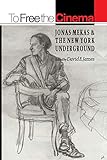To Free the Cinema : Jonas Mekas and the New York Underground / ed. by David E. James.
Material type: TextPublisher: Princeton, NJ : Princeton University Press, [2021]Copyright date: ©1992Description: 1 online resource (352 p.)Content type:
TextPublisher: Princeton, NJ : Princeton University Press, [2021]Copyright date: ©1992Description: 1 online resource (352 p.)Content type: - 9780691219554
- Experimental films -- New York (State) -- New York
- Motion picture industry -- New York (State) -- New York
- PERFORMING ARTS / Film & Video / History & Criticism
- Agee, James
- Anger, Kenneth
- Anthology Film Archives
- Baillie, Bruce
- Beat Generation
- Brakhage, Stan
- Cahiers du Cinéma
- Cassavetes, John
- Cinema
- Deren, Maya
- Emerson, Ralph Waldo
- Film Culture
- Foreman, Richard
- Frank, Robert
- Ginsberg, Allen
- Grand Street (Jonas Mekas)
- Harrington, Curtis
- Hill, Jerome
- Hollywood film industry
- Impressionism
- Intro Bulletin
- Jacobs, Ken
- Kerouac, Jack
- Kubelka, Peter
- Lennon, John
- Lithuania
- Living Theater
- Maas, Willard
- Markopolous, Gregory
- Mekas, Adolfas
- New American Cinema
- Ono, Yoko
- Peterson, Sidney
- Rice, Ron
- Sarris, Andrew
- Sitney, P. Adams
- Thoreau, Henry David
- Vietnam War
- Welles, Orson
- diary film
- realism
- 791.43/015 23
- PN1998.3.M44 T6 1992eb
- online - DeGruyter
| Item type | Current library | Call number | URL | Status | Notes | Barcode | |
|---|---|---|---|---|---|---|---|
 eBook
eBook
|
Biblioteca "Angelicum" Pont. Univ. S.Tommaso d'Aquino Nuvola online | online - DeGruyter (Browse shelf(Opens below)) | Online access | Not for loan (Accesso limitato) | Accesso per gli utenti autorizzati / Access for authorized users | (dgr)9780691219554 |
Frontmatter -- Contents -- Acknowledgments -- Introduction -- Routines of Emancipation: Alternative Cinema in the Ideology and Politics of the Sixties -- The Old Days -- "Loved Him, Hated It": An Interview with Andrew Sarris -- The Apron Strings of mm Jonas Mekas -- How I Think I Made Some of My Films -- The Forest and The Trees -- Notes on Displacement: The Poems and Diary Films of Jonas Mekas -- During the Second Half of the Sixties -- Film Diary/Diary Film: Practice and Product in Walden -- A Portfolio of Photographs -- Reminiscences, Subjectivities, and Truths -- My Contacts with Jonas Mekas -- Lost, Lost, Lost: Mekas as Essayist -- Dear Friends -- Film Writing and the Figure of Death: He Stands in a Desert Counting the Seconds of His Life -- A Tale of Two Co-ops -- Jonas Mekas -- Wearing the Critic's Hat: History, Critical Discourses, and the American Avant-Garde Cinema -- Who Is Afraid of Jonas Mekas? -- Video at Anthology -- I Feel Passionate about the Film Journals of Jonas Mekas -- Home Movies of the Avant-Garde: Jonas Mekas and the New York Art World -- Appendixes -- Index
restricted access online access with authorization star
http://purl.org/coar/access_right/c_16ec
Jonas Mekas, one of the driving forces behind New York's alternative film culture from the 1950s through the 1980s, made for an unlikely counterculture hero: a Lithuanian emigr and fervent nationalist from an agrarian family, he had not grown up with either capitalist commercialism or the postwar rebellion against it. By focusing on his sensitivity to political struggle, however, leading film commentators here offer fascinating insights into Mekas's career as a writer, filmdistributor, and film-maker, while exploring the history of independent cinema in New York since World War II. This collection of essays, interviews, and photographs addresses such topics as Mekas's column in the Village Voice, his foundation and editorship of Film Culture, his role in the establishment of Anthology Film Archives and The Film-Makers Co-op (the major distribution center for independent film), his interaction with other artists, including John Lennon and Yoko Ono, and finally the critical assessment of his own films, from Guns of the Trees and The Brig in the sixties to the diary films that followed Walden. The contributors to this volume are Paul Arthur, Vyt Bakaitis, Stan Brakhage, Robert Breer, Rudy Burckhardt, David Curtis, Richard Foreman, Tom Gunning, Bob Harris, J. Hoberman, David E. James, Marjorie Keller, Peter Kubelka, George Kuchar, Richard Leacock, Barbara Moore, Peter Moore, Scott Nygren, John Pruitt, Lauren Rabinovitz, Michael Renov, Jeffrey K. Ruoff, and Maureen Turim.
Mode of access: Internet via World Wide Web.
In English.
Description based on online resource; title from PDF title page (publisher's Web site, viewed 30. Aug 2021)


